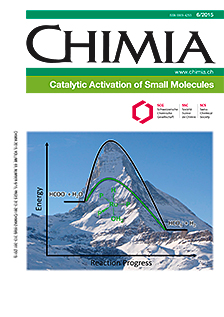The Role of Proton Transfer in Heterogeneous Transformations of Hydrocarbons
DOI:
https://doi.org/10.2533/chimia.2015.321Keywords:
Heterogeneous catalysis, Proton transferAbstract
Heterogeneous catalysis is essential for the transformation of light hydrocarbons into chemical feedstocks. Many of the catalysts that mediate these transformations consist of isolated metal ions on the surface of a metal oxide support, such as silica or alumina. Due to the complexity of these catalysts, studying the active site and mechanism of these reactions is difficult. Surface organometallic chemistry (SOMC) could offer a solution to this problem by allowing the synthesis of well-defined surface organometallic species. This approach has been used to study the reactions of light hydrocarbons with isolated metal species on silica and alumina surfaces. These studies showed that proton transfers play a key role in the reactions of many hydrocarbons. The mechanisms of these reactions and their role in some common catalytic cycles are discussed.Downloads
Published
2015-06-24
Issue
Section
Scientific Articles
License
Copyright (c) 2015 Swiss Chemical Society

This work is licensed under a Creative Commons Attribution-NonCommercial 4.0 International License.
How to Cite
[1]
D. P. Estes, C. Copéret, Chimia 2015, 69, 321, DOI: 10.2533/chimia.2015.321.







